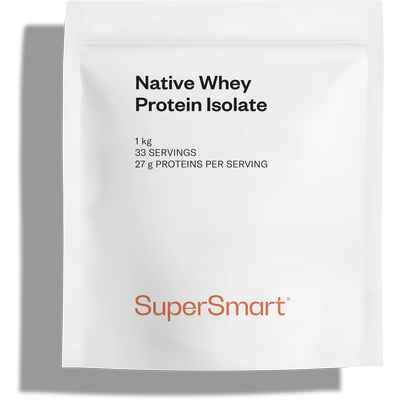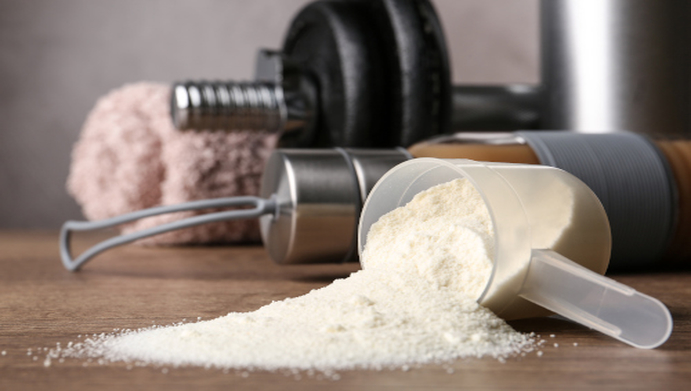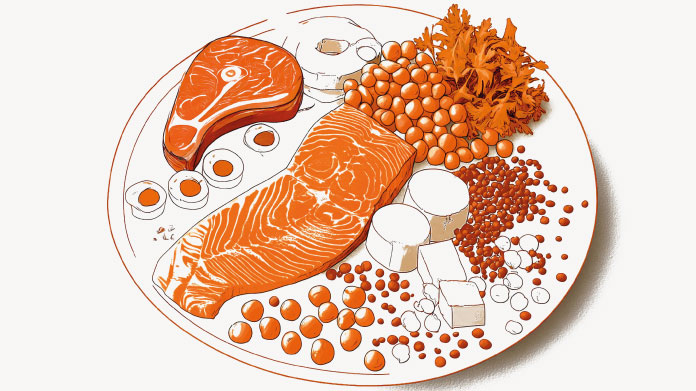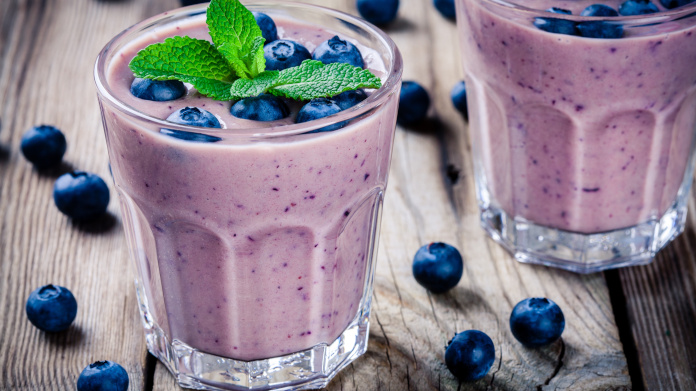When to take whey: times and frequency
When should you take whey to get the maximum benefits? Morning or evening, post-training, between meals... Here are some guidelines to help you adapt your whey intake to your needs and goals.

What is whey, and what exactly is it used for?
Whey is a protein of dairy origin, extracted from the liquid part produced during the coagulation of milk (known as whey).
Also known as whey protein, it comes in the form of a powder to be mixed with water, milk or any other type of drink.
Its main characteristics are:
- its richness in essential amino acids, particularly BCAAs (branched-chain amino acids);
- its rapid digestion, assimilation and absorption;
- its high leucine content, a key amino acid in muscle protein synthesis.
An excellent source of protein, whey is very popular in the world of sport. It is used to easily and effectively meet the high protein needs of certain individuals (particularly those who are involved in bodybuilding or who wish to maintain or develop their muscle mass).
Proteins are crucial for the maintenance and development of muscle mass.
When should whey be taken to maximise its effects?
Recovery, mass gain, muscle maintenance or weight loss... The best time to take whey depends largely on your objective.
Around training: the key time for recovery and muscle building
It is generally recommended to consume whey before or after training, ideally within 30 to 60 minutes of a bodybuilding session or intense workout (1).
This is because it is during this 'anabolic window' that amino acids are best assimilated.
This helps to:
- rapidly restart muscle protein synthesis;
- repair muscle fibres damaged during exercise;
- promote the development of muscle mass.
As whey is very quickly assimilated, it rapidly delivers the amino acids needed for muscle rebuilding.
It should be taken around the time of training if your aim is to build muscle, recover quickly or reduce post-exercise catabolism (the breakdown of muscle tissue after a session).
At breakfast: to enrich a meal that is often low in protein
Often based on bread, cereals and jam, the typical Western breakfast is high in carbohydrates and low in protein.
However, a good protein intake in the morning helps to:
- reduce blood sugar peaks (2);
- reduce mid-morning hunger pangs;
- better control your weight;
- support muscle mass.
Adding a whey shake to breakfast – or incorporating it into a porridge, smoothie or pancake – helps to balance the meal and make it easier to reach your daily protein intake.
Breakfast should be considered if your aim is to stabilise your energy, regulate your appetite or prevent muscle wasting.
Between meals: to support your goal of building muscle mass
As part of a mass gain strategy, it can be useful to add protein-rich snacks throughout the day, without excessively increasing the calorie load or overloading the digestive system.
Adding protein between meals helps to:
- maintain a constant flow of amino acids in the blood;
- increase calorie intake in a clean way;
- prevent muscle breakdown, particularly in the event of prolonged fasting.
This is an interesting option for people who undergo intensive training or who find it difficult to put on weight.
Before bed: a controversial option
Unlike casein (a slow-digesting protein), whey is rapidly assimilated and does not prevent nocturnal catabolism. There is therefore little point in taking whey before going to bed (especially if the last meal was sufficiently rich in protein).
That said, some athletes choose to take a whey shake before bed to top up their protein quota for the day.
According to a scientific study, ingesting protein before sleep could help to increase muscle mass and strength gains during resistance exercise (3).
How many times a day should I take whey?
You don't have to take whey every day. It all depends on your diet, your goals, your weight, your physical activity and your lifestyle.
Bear in mind that daily protein requirements vary between 0.83 g/kg (for a sedentary person) and 2.2 g/kg body weight (for an intensive sportsperson) (4). If your diet already largely meets these requirements, there's no need to add whey.
On the other hand, if you find it difficult to reach your daily intake via meals – or if you're in a period of dietary restriction – whey is a practical and effective supplement.
We recommend:
- taking between 1 and 2 servings per day;
- respecting the doses indicated by the manufacturer;
- not exceeding the recommended protein intake, as some people run the risk of unnecessarily overloading their kidneys (particularly in the case of kidney disease).
How do I choose a quality whey?
There are different types of whey, and not all are created equal. To take full advantage of its effects, it is best to opt for a pure, easily assimilated protein free from unnecessary additives.
Native whey is purer and more intact than traditional whey. It is extracted directly from fresh cow's milk, without going through the cheese-making process. This makes it possible to:
- limit the denaturation associated with industrial processes and preserve the natural structure of the proteins;
- guarantee better nutritional quality and a higher protein content.
And, unlike simple whey concentrate, whey isolate is obtained through advanced filtration.
This guarantees:
- a higher protein content (generally >90%);
- less lactose, sugar and fat;
- easier digestion, even for sensitive individuals.
Opting for a native whey isolate means you can enjoy maximum benefits.
![]() Discover Native Whey Protein Isolate, formulated from isolated, undenatured, cold-filtered native whey and naturally enriched with BCAAs.
Discover Native Whey Protein Isolate, formulated from isolated, undenatured, cold-filtered native whey and naturally enriched with BCAAs.
SUPERSMART ADVICE
References
- West DWD, Abou Sawan S, Mazzulla M, Williamson E, Moore DR. Whey Protein Supplementation Enhances Whole Body Protein Metabolism and Performance Recovery after Resistance Exercise: A Double-Blind Crossover Study. Nutrients. 2017 Jul 11;9(7):735. doi: 10.3390/nu9070735. PMID: 28696380; PMCID: PMC5537849.
- Jakubowicz D, Wainstein J, Landau Z, Ahren B, Barnea M, Bar-Dayan Y, Froy O. High-energy breakfast based on whey protein reduces body weight, postprandial glycemia and HbA1C in Type 2 diabetes. J Nutr Biochem. 2017 Nov;49:1-7. doi: 10.1016/j.jnutbio.2017.07.005. Epub 2017 Jul 21. PMID: 28863364.
- Snijders T, Res PT, Smeets JS, van Vliet S, van Kranenburg J, Maase K, Kies AK, Verdijk LB, van Loon LJ. Protein Ingestion before Sleep Increases Muscle Mass and Strength Gains during Prolonged Resistance-Type Exercise Training in Healthy Young Men. J Nutr. 2015 Jun;145(6):1178-84. doi: 10.3945/jn.114.208371. Epub 2015 Apr 29. PMID: 25926415.
- https://www.anses.fr/fr/content/les-proteines#:~:text=Dans%20l'%C3%A9tat%20actuel%20des,de%20moins%20de%2060%20ans.
Keywords
1 Days
The delivery was fast and the product…
The delivery was fast and the product is great
SOMMARIVA Gianni
3 Days
Great service and lots of information
Great service and lots of information
Gabi
6 Days
Service Satisfaction
I’m satisfied with the service; it fulfilled what it set out to do.
Anfhony Abreu
9 Days
Original product and fast delivery
Original product and fast delivery. I haven't started it yet, but will do soon.
Vincenza Catania
11 Days
Good quality
Good quality. Good service.
Leonel Guzman
13 Days
Top!!!!!!!!
Top!!!!!!!!
Michael
15 Days
Excellent!
Products are great and delivered fast!
PARDINI Debora
16 Days
From order to receive the product
From order to receive the product, the process is smooth & fast. It’s good to customers.
WONG Mei Ling
17 Days
Fast delivery
very quick delivery to italy. product is good.
Customer
18 Days
Prompt delivry !!👍
Prompt delivry !!👍
SWEET Christine
19 Days
Good delivery and flawless quality
AS far as delivery and the visual quality are concerned, Supersmart is excellent. I will not comment on the efficacy of the products themselves, since that is only possible over a longer period and in a large customer base compared to people who do not consume a particular product.
Roger De Backer
20 Days
Perfect services
Perfect services, perfect support, great articles about products
Michaela Alali Beitlová
20 Days
Great experience and effective supplements
I’ve purchased many types of supplements from this company over the course of years to treat a few issues, and I’m satisfied with their quality. After using them consistently for a period of time, I can say they met my expectations and I could feel real health benefits that built up over time. Deliveries are always quick. I recommend this company to anyone looking for high-quality supplements.
Giordano
20 Days
Es hat alles gestimmt
Es hat alles gestimmt. Top
marina thieme
24 Days
Great product
Great product, but still evaluating its effectiveness. Highly recommended. Super efficient delivery.
Chalise
of experience
your money back
##montant## purchase




